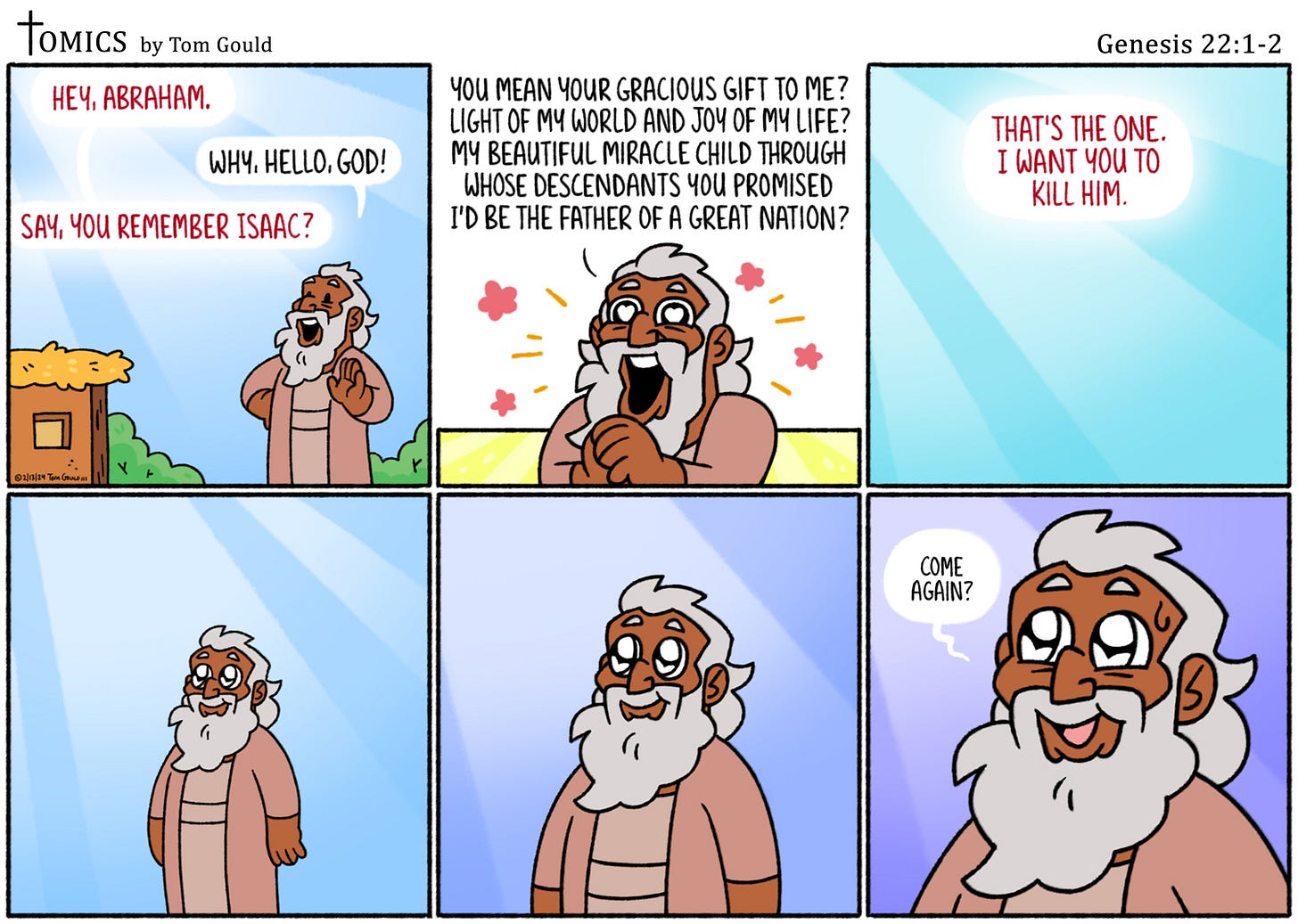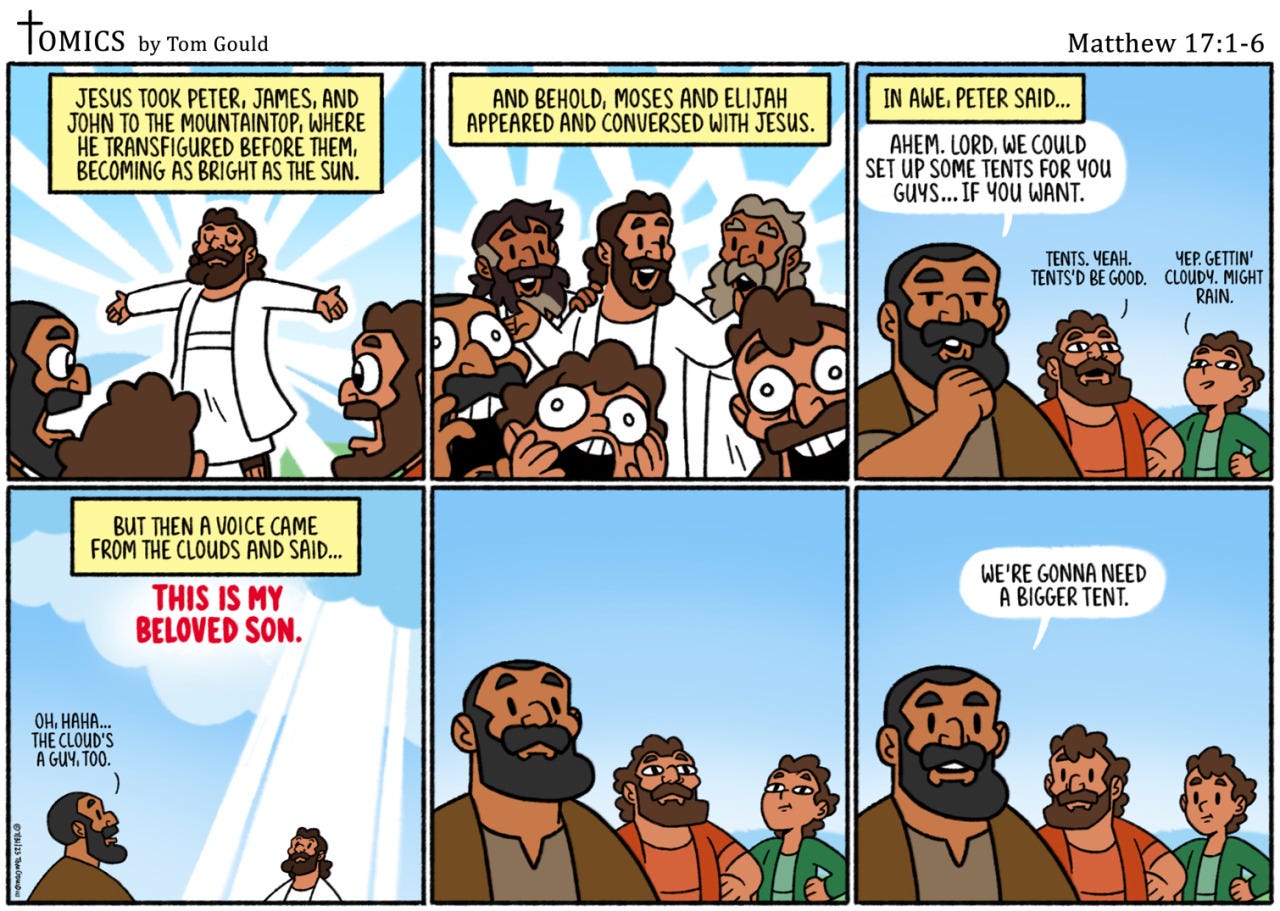Today’s first reading might be a hard one for parents.
Reading 1
Gn 22:1-2, 9a, 10-13, 15-18
God put Abraham to the test. He called to him, "Abraham!"
"Here I am!" he replied.
Then God said: "Take your son Isaac, your only one, whom you love, and go to the land of Moriah. There you shall offer him up as a holocaust on a height that I will point out to you."
When they came to the place of which God had told him, Abraham built an altar there and arranged the wood on it. Then he reached out and took the knife to slaughter his son. But the LORD's messenger called to him from heaven, "Abraham, Abraham!"
"Here I am!" he answered.
"Do not lay your hand on the boy," said the messenger. "Do not do the least thing to him. I know now how devoted you are to God, since you did not withhold from me your own beloved son."
As Abraham looked about, he spied a ram caught by its horns in the thicket. So he went and took the ram and offered it up as a holocaust in place of his son.
Again the LORD's messenger called to Abraham from heaven and said: "I swear by myself, declares the LORD, that because you acted as you did in not withholding from me your beloved son, I will bless you abundantly and make your descendants as countless as the stars of the sky and the sands of the seashore; your descendants shall take possession of the gates of their enemies, and in your descendants all the nations of the earth shall find blessing—all this because you obeyed my command."
We know how this story ends, but Abraham and Isaac didn’t. They had to trust God in the most extreme way imaginable. They serve as a model of faith when God demands of us things we don’t want to do.
But they’re not the only model in this story, as we’ll see in the second reading.
Responsorial Psalm
Ps 116:10, 15, 16-17, 18-19
R. (116:9) I will walk before the Lord, in the land of the living.
I believed, even when I said,
"I am greatly afflicted."
Precious in the eyes of the LORD
is the death of his faithful ones.
R. I will walk before the Lord, in the land of the living.
O LORD, I am your servant;
I am your servant, the son of your handmaid;
you have loosed my bonds.
To you will I offer sacrifice of thanksgiving,
and I will call upon the name of the LORD.
R. I will walk before the Lord, in the land of the living.
My vows to the LORD I will pay
in the presence of all his people,
In the courts of the house of the LORD,
in your midst, O Jerusalem.
R. I will walk before the Lord, in the land of the living.
Yahweh is not the God of the Dead, but the God of the Living. And so we believe that death is not the end. Even if circumstances demand that we give up our lives like martyrs, God doesn’t let it end there.
Reading 2
Rom 8:31b-34
Brothers and sisters: If God is for us, who can be against us? He who did not spare his own Son but handed him over for us all, how will he not also give us everything else along with him?
Who will bring a charge against God's chosen ones? It is God who acquits us, who will condemn? Christ Jesus it is who died—or, rather, was raised—who also is at the right hand of God, who indeed intercedes for us.
God doesn’t ask the impossible; he doesn’t demand we do something He Himself wouldn’t do. Just as He commanded Abraham to sacrifice his only son, God the Father did the same with Jesus.
Jesus, being perfect, wholly human and totally divine, was a perfect sacrifice. Like Isaac, He went to His death willingly.
These are hard demands, but God has shown us by His own example that we are able to stand against the fires of Hell itself.
Verse Before the Gospel
Cf. Mt 17:5
From the shining cloud the Father's voice is heard:
This is my beloved Son, listen to him.
God is directly telling us, through words and miracles, to listen to His Son. We should probably do that.
Gospel
Mk 9:2-10
Jesus took Peter, James, and John and led them up a high mountain apart by themselves. And he was transfigured before them, and his clothes became dazzling white, such as no fuller on earth could bleach them. Then Elijah appeared to them along with Moses, and they were conversing with Jesus.
Then Peter said to Jesus in reply, "Rabbi, it is good that we are here! Let us make three tents: one for you, one for Moses, and one for Elijah." He hardly knew what to say, they were so terrified.
Then a cloud came, casting a shadow over them; from the cloud came a voice, "This is my beloved Son. Listen to him."
Suddenly, looking around, they no longer saw anyone but Jesus alone with them.
As they were coming down from the mountain, he charged them not to relate what they had seen to anyone, except when the Son of Man had risen from the dead. So they kept the matter to themselves, questioning what rising from the dead meant.
This reading cuts off the beginning of the first verse, “After six days Jesus took Peter, James, and John…” Meaning, six days after He first told them the Messiah had to suffer and die. Matthew agrees with this timing, but Luke says it’s eight days. You can chalk up the discrepancy to simply faulty memory on the part of one or another witness, but I think it’s notably neither of them say seven days.
Back then, they didn’t track the days as closely as we do now. It was mostly either the Sabbath, or not-the-Sabbath. They didn’t really have “weekends” as we think of them today. The fact that they get the days wrong, but wrong by exactly the same amount, just in opposite directions, indicates that either the prophesy of the passion happened on the sabbath, or the transfiguration did, because that’s the only day of the week that would stick out in their minds.
I can’t find any textual evidence to support either way, but I suspect the transfiguration described in today’s reading happened on the first day of the week, what we would call Sunday, but to ancient Jews, is the day after the Sabbath. I think so, because although Jesus made a habit out of performing healing miracles on the Sabbath to drive the Pharisees nuts, Easter itself occurs on a Sunday.
All of which is to say Peter, James and John (unlike Abraham and Isaac) were told how the story would end—with Jesus’ death and resurrection.
In today’s Gospel, they even get a preview what the bodily resurrection will be like. Jesus is still recognizably Jesus, but in a glorified form. Later on, after the Resurrection, the disciples on the road to Emmaus don’t even recognize Jesus. Peter, James, and John actually see the change and can (barely) comprehend it.
Seeing isn’t necessarily believing. We know more than the disciples did at the time, but we’re still just reading text. We have to have faith that what’s written in the Gospels gives some indication of what it will be like for us, as well.





